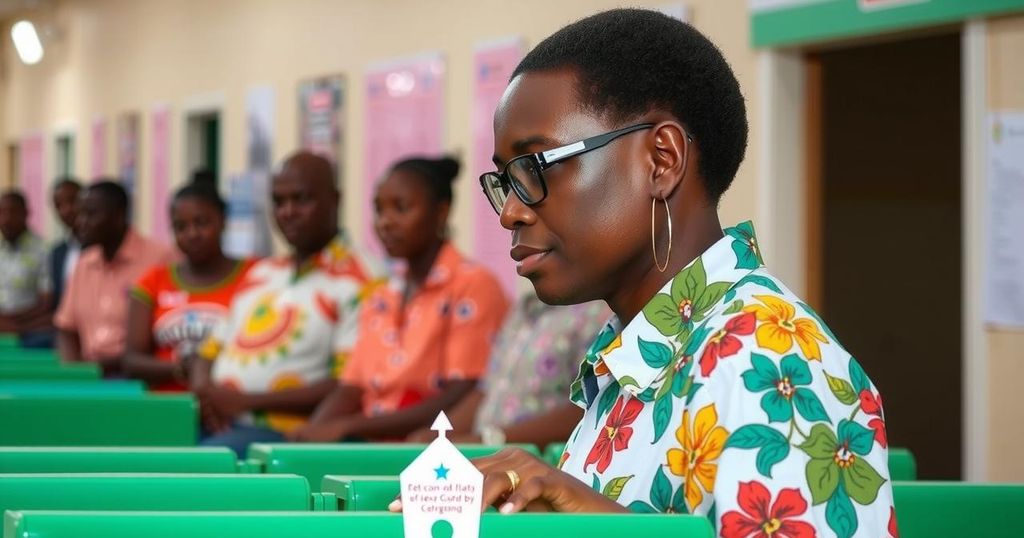Ghana Elections: Democracy Tested Amid Economic Turmoil
Ghana’s presidential and legislative elections were held under the shadow of a severe economic crisis, with 18.7 million voters registered. The two main candidates, Vice President Mahamudu Bawumia and former President John Dramani Mahama, represent parties that face scrutiny for their economic management. Key issues include inflation, unemployment, and illegal gold mining, all of which have shaped voter sentiment as expressed in recent polls. Voter concerns center on finding credible solutions to these dire economic circumstances.
Voting commenced in Ghana on Saturday for the presidential and legislative elections, marking an important moment for democracy in a region grappling with instability due to extremist violence and coups. Approximately 18.7 million registered voters face an economic climate characterized by severe hardship. Predictions indicate that the two leading candidates may offer minimal prospects for meaningful change amidst this crisis.
Once celebrated as a model of democratic governance in West Africa, Ghana is currently contending with its most severe economic downturn in decades. The country has experienced soaring inflation rates and widespread unemployment. A recent Afrobarometer poll unveiled that 82% of Ghanaians believe the country is moving in a negative direction.
While twelve candidates are vying for the presidency, this election has essentially boiled down to a contest between Vice President Mahamudu Bawumia of the ruling New Patriotic Party (NPP) and former President John Dramani Mahama of the National Democratic Congress (NDC). The NPP has faced scrutiny over its inability to effectively manage the economic crisis, while Mahama seeks redemption after a previous term that ended in 2016 due to unmet economic promises.
In total, 276 parliamentary representatives are up for election, with the NPP and NDC evenly split in the current legislature. During the final campaign rallies, both candidates attempted to present their parties as the solution to Ghana’s dire economic situation. Bawumia emphasized his intent to continue the previous administration’s initiatives to stabilize the economy, while Mahama advocated for a comprehensive “reset” in various sectors, stating, “We need to reset our democracy, governance, economy, finances, agriculture, infrastructure, environment, health sector and all that we hold dear as a people.”
As the atmosphere in Accra buzzed with political energy—marked by street rallies and public displays—underlying concerns about the economic situation remained prominent. The country’s economy has suffered, particularly following a default on foreign debts last year, contributing to elevated costs for fuel and food, with inflation hitting an alarming 54%. Although some signs of improvement are evident, many Ghanaians feel little change in their daily lives.
The rampant issue of illegal gold mining, known locally as galamsey, has also featured heavily in the campaign discourse, provoking significant voter concern. While Ghana stands as Africa’s leading gold producer, illegal mining activities have proliferated as economic desperation intensifies, resulting in environmental degradation despite governmental attempts to regulate the practice.
Recent political events in West Africa, particularly a series of coups and growing extremist violence, underscore the significance of Ghana’s upcoming elections. Traditionally viewed as a stable democracy since its return to multiparty politics in 1992, Ghana now faces an unprecedented economic crisis. The nation’s struggle with inflation, job scarcity, and social unrest exemplifies the broader challenges facing emerging democracies in the region. Understanding this context is crucial when examining the upcoming elections and their implications for Ghana’s future.
The elections in Ghana represent a pivotal moment for the nation’s democratic process amid a broader regional context characterized by political unrest. As citizens head to the polls, they are not only voting for their leadership but also confronting the significant economic challenges that have recently beleaguered the nation. The outcome is likely to influence Ghana’s recovery trajectory, with both primary candidates having the task of articulating a viable plan to navigate the country’s complexities.
Original Source: www.voanews.com




Post Comment